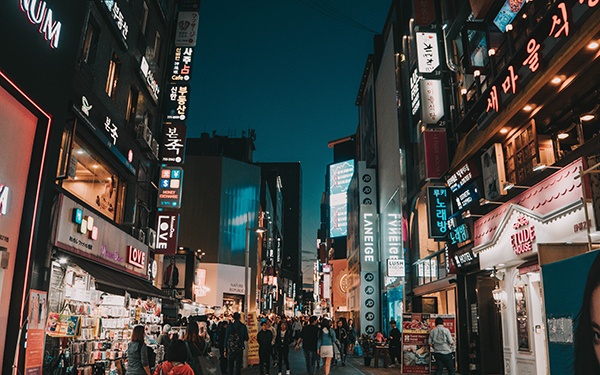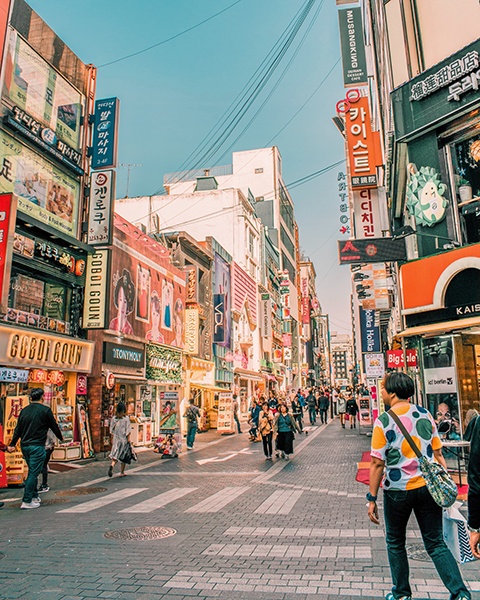Are you considering moving to South Korea from the UK?
South Korea is a fascinating nation with a booming economy, full of opportunities for British expats.
Progressive, modern and fast paced, South Korea also has strong ties to its past and cultural heritage, and tradition and technology go hand in hand.
The natural landscape is stunning, the people warm and friendly, the food amazing, and the history and culture endlessly intriguing.
Although it may not be a conventional expat destination, increasing numbers of foreigners are choosing to make South Korea their home.
Want to know why South Korea is fast becoming so popular with British expats?
Find out everything you need to know in our essential guide to moving to South Korea…
Contents
South Korea Visa Requirements for Brits
Visiting
While the UK still remains part of the EU it is possible to visit South Korea for a period of up to 3 months without a visa.
Post Brexit things are likely to change, and the most likely scenario is that Brits will have to apply for a 90 day visitors visa from the nearest South Korean embassy or consulate.
In order to apply you will need to make sure that your passport is valid for at least six months beyond the date of arrival.
Working
There are various different types of work permit available to foreigners moving to South Korea which are awarded depending on the duration of stay and the type of employment.
These include Temporary Employment, Foreign Language Teaching, and Special Profession permits, which are probably the most common for expats, and application requirements may differ depending on the type of permit.
To obtain a work permit, expats must have a sponsor — usually an employer — in South Korea who will apply for the work permit on their behalf.
Once the Ministry of Justice confirms with the representing agency or sponsor, it is then determined whether the visa should be authorised. Once the applicant arrives in the country, the Ministry of Justice gives a certificate of confirmation of visa issuance that will be submitted by the applicant to the Korean embassy or consulate.
Work permits must be applied for before entering South Korea from the Korean embassy or consulate. Once granted you have 90 days in which to enter the country for your visa to be valid.
Permanent Residency
Expats wanting to stay in South Korea are obliged to apply for an Alien Registration Certificate from the Korean Office of Immigration.
Once the certificate is granted, foreigners will receive a registration card which is valid for one year.
Permanent residency for expats in South Korea can be granted on several grounds: if you have been resident in the country for more than 5 years on a temporary residence visa you have the right to apply, if you own your own business in South Korea and have generated more than $500,000 and employ a minimum of 5 native employees, or if you are an expat with superior skills working in fields such as education or science.
Way of Life in South Korea
Lifestyle
Life in South Korea is very different to that in the UK, and some expats experience a certain amount of culture shock, so if you’re considering a move it’s worth being prepared.
That said, relocating to South Korea can be an incredible experience. English is not widely spoken outside of the major cities, and many foreigners prefer to circulate only within the expat community.
Be prepared to learn the local language to integrate more smoothly with the locals. Koreans are fiercely proud of their culture and family is at the heart of their daily lives, with men and women filling largely conventional roles within the home and emphasis on respect for ancestors, age, and seniority.
Korean cuisine is the focus of any social or family gathering — it’s fresh, spicy and totally delicious. Multiple dishes — all of which are shared apart from rice and soup — are presented at mealtimes and often cover the table completely.
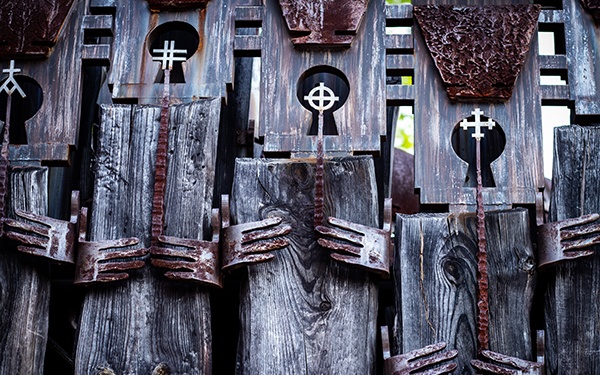
South Korean cities are densely populated, cosmopolitan, multicultural, and buzzing with nightlife, entertainments, and international and Asian restaurants and bars.
Rural areas are made up of small communities who may not often encounter foreigners, and the pace of life is laid back.
Despite regional tensions with North Korea, South Korea is a pretty safe place to live, with a low crime rate. Although South Korea is technically still at war with North Korea, certain tensions remain between the borders.
That said, security is high and there is little to suggest that foreigners should be worried, although it’s worth keeping an eye on the local news to stay informed of any changes in the situation.
Getting Around
When travelling long distance in South Korea, train, plane, and bus are the best options.
The country’s rail network is very efficient, and trains are clean and comfortable for long journeys, as well as affordable, although not all destinations are covered.
Domestic flights are convenient and reasonably priced, and offer a quick way to travel between a dozen or so major cities. Buses are the best way to travel to more out of the way locations.
Express buses link major cities, but smaller towns and villages are well served by frequent intercity services.
If you want to head out and explore one of South Korea’s many offshore islands, there are extensive ferry services that connect the islands to each other and which travel to and from the mainland.
Six of the major South Korean cities now have underground networks which are cheap and easy to navigate.
City bus networks however can be a little confusing at first, but once you’ve mastered your route they are a very inexpensive way to get around.
Taxis are also affordable, and can be hailed in the street. The majority of taxis are metered, but many taxi drivers don’t speak English so be sure to have your destination written down in Korean.
Driving in South Korea
Driving in South Korea can be a somewhat dicey experience.
Cities are frequently rammed with traffic, and can be very difficult to navigate, and the road fatality rate of the country as a whole is alarmingly high due to reckless Korean drivers.
If you do decide to take to the road under your own steam you will need an international driving license and be over 21 years of age in order to drive legally.
Hiring a vehicle can be rather expensive, so most people opt to use public transport instead. Vehicles drive on the right hand side of the road, and insurance is compulsory.
Weather in South Korea
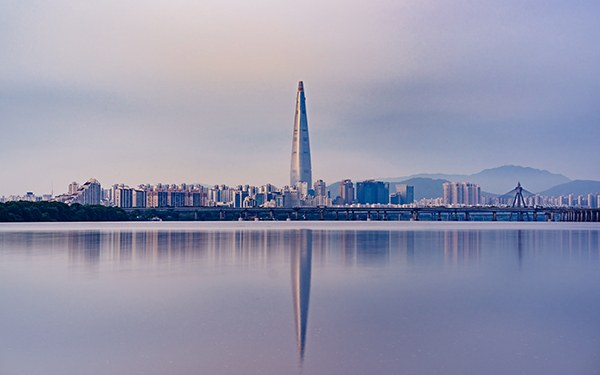
The South Korean climate has 4 distinct seasons just like the UK.
From April to the end of May, the spring season has sunshine and showers, pleasant temperatures of around 15°C to 18°C. Summer is relatively short, lasting from June to August, and brings hot and humid weather with temperatures soaring up to 30°C, accompanied by lots of rainfall — particularly towards the end of the season.
Autumn brings a pleasant respite with mild temperatures and little rainfall – this is one of the most enjoyable times of year in South Korea.
Winter runs from December to March, during which time temperatures drop dramatically to as low as -20°C in some northern regions, although this season is also dry and snowy, which adds its own charm to the South Korean landscape.
Cost of Living in South Korea
Lifestyle
Living in South Korea can be very affordable.
Alcohol is cheap, and eating out in restaurants is also very low cost compared to UK standards, although international restaurants and goods come at a higher price.
Electrical goods are reasonably priced and groceries can be bought inexpensively, although certain fresh produce can cost more than in the UK. Clothes tend to be on the pricier side.
Transport of all kinds is inexpensive and a wallet friendly way to get around.
As with most countries, living costs in the city are significantly higher to those in rural areas. That said however, the average cost of living in South Korea’s capital city Seoul is a staggering 39% cheaper than living in London.
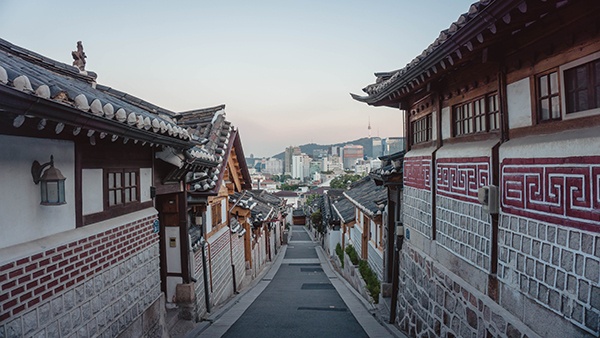
Rent
Utilities such as electricity, water, and gas cost considerably less than back in the UK? Internet is also very affordable and insanely fast.
Rental prices vary wildly depending on location, with those in the main cities of Seoul and Busan being the most expensive.
Housing in areas with fewer foreign residents tend to be cheaper than those with large numbers of expats in residence.
Apartments — particularly in the city — tend to be small. It is still cheaper to rent accommodation in South Korea than in the UK however. Even in Seoul rental prices are roughly 20% cheaper for equivalent properties than in London.
Here’s a handy video on what one expat spends as she lives in Seoul:
Healthcare
South Korea possesses an excellent healthcare system with modern facilities and well qualified medical staff providing a high level of care.
Any expat living in the country must enrol in the government national health insurance scheme unless they have equal coverage from the national insurance in their home country or via insurance provided by an employer.
To participate in the NHI system, foreign nationals must first have an Alien Registration Certificate. Registering with the NHI scheme means that a small contribution towards healthcare costs will be automatically deducted from your monthly wages on a sliding scale, just like in the UK.
However the NHI system does not completely cover all procedures and medications, particularly for serious or chronic illness, so it is advisable for British expats living in South Korea to take out additional private health insurance in order to be fully covered for any eventuality.
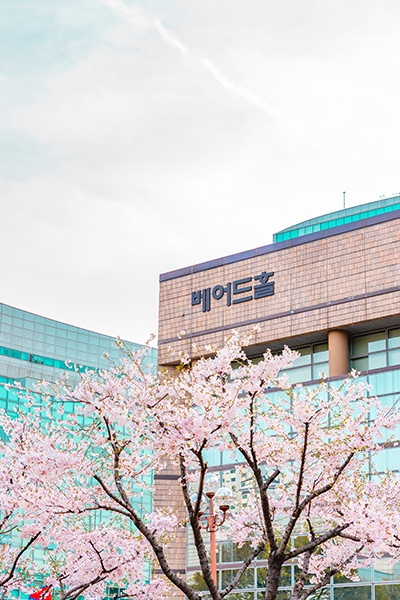
Schooling
South Korean public schools are affordable and provide a very good standard of education, however there is a strict study ethic in place which requires children to study for more than 8 hours per day.
This combined with the fact that Korean schools are highly competitive and only provide lessons taught in the Korean language, provokes the vast majority of expat families to enrol their children in international schools where lessons are taught in English and the curriculum is familiar and less stressful for students.
The quality of education in public schools is even higher than that of Korean public schools, but entry is often dependent on admission requirements set by the schools — this may include a letter of recommendation, examples of previous written work, recent exam results, and attending an interview – and can involve paying some hefty school fees.
Fees tend to cost upwards of around £5000 per year for primary education, and £6500 per year for secondary education, in addition to around £1000 worth of enrolment fees.
Popular Areas for Brits
Seoul
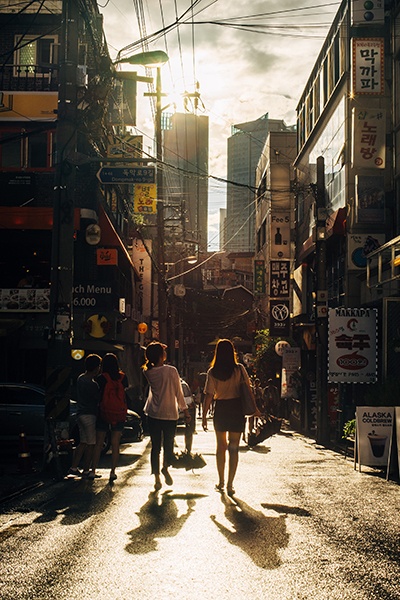
Sensational Seoul is a vibrant, dynamic capital which has the best of cosmopolitan living, history and tradition, and entertainment, where sumptuous palaces and temples sit proudly next to glittering skyscrapers.
Buzzing at any time of day or night, Seoul is South Korea’s premier destination for expats, who are drawn to the fabulous restaurants and gigantic malls, electric nightlife, large and welcoming expat community, cute café culture, and excellent job opportunities.
This is a city that never sleeps, where you can get your hands on almost anything you want at any time of day or night.
Incheon
The chic and colourful city of Incheon just a short hop south from Seoul is founded around an industrial port and has long been considered Southern Korea’s gateway to the rest of the world.
Situated on the coast, Incheon is a vivacious city with plenty to charm expats, from the beautiful harbour and sparkling seafront bursting with boutiques, restaurants, and bars, to fabulous fish markets, and a thriving and characterful Chinatown.
Busan
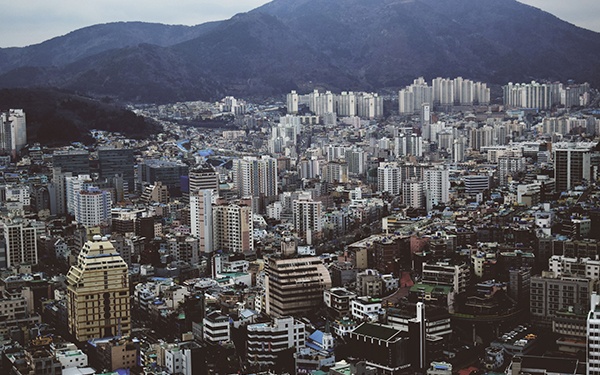
Korea’s second largest city is a major cultural, trade, business and educational hub, and is thought to be one of the best cities in Asia for quality of living.
Located on the south coast, Busan is one of the most important ports in the world and it has a whole host of delights to offer British expats.
Surrounded by misty mountains and rimmed with golden beaches, this is a city for nature lovers. It’s also filled with fantastic markets, incredible seafood restaurants, and hip bars and cafés.
Jeju

Korea’s favourite island getaway, Jeju is undeniably romantic. Volcanic crags crown the island, waterfalls tumble down craggy cliffs, and pristine palm fringed beaches line the shores.
The island boasts several UNESCO world heritage sites and a breathtakingly beautiful national park.
Jeju city is the island’s most populated area and it’s where you’ll find the coolest bars, best shopping, great restaurants, and a small community of lucky expats.
Gwangju
Gwangju is a sizeable south west Korean city in a fantastic location close to national parks, beaches, temples, tea fields, and forests.
It’s well known for its streets lined with restaurants serving cuisine from all over the globe, and thanks to its artistic legacy lays claim to a thriving arts scene which boasts a wealth of museums, exhibitions and festivals.
It’s also home to one of the largest and friendliest expat communities in South Korea.
Cheongju
Also known as the City of Rivers, Cheongju packs a lot of small town charm. It’s South Korea’s national administrative centre, and there are a large number of important educational establishments. T
he city has an interesting military history, and ruins from medieval battles can still be seen today.
Jobs in South Korea for British Expats
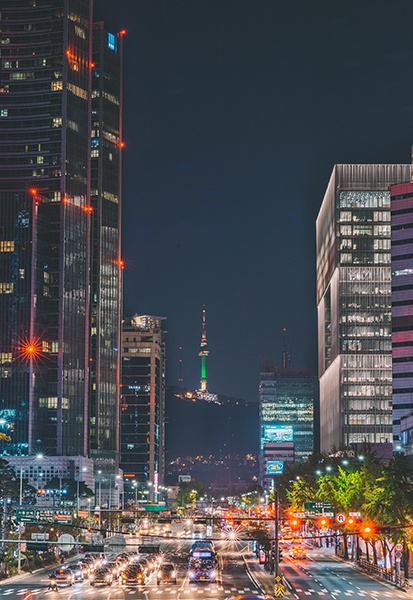
With an already strong and continually expanding economy and a government pushing hi-tech industries and exports, South Korea offers some promising employment opportunities for UK expats.
Native English speakers are in quite high demand to work in education, and although this is the field many expats choose to pursue when relocating to South Korea, there are increasing amounts of roles becoming available in other fields too.
Information and technology, telecommunications, biotechnology, electronics and car manufacturing are just some of the other industry sectors where expats may find employment.
Are you considering moving to South Korea from the UK?

